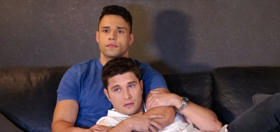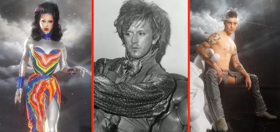
We have a feeling Derek Simonds loves to sneak.
The ambitious, thoughtful writer made his debut scripting and directing the ensemble dramedy Seven and a Match back in 2001. Despite the success of the film, years of false starts and development hell plagued his career thereafter. He finally broke free in 2015 with a transition to television, writing for the series The Astronaut Wives Club. Work on the queer history miniseries When We Rise followed, as did a little movie titled Call Me By Your Name on which Simonds served as producer (more on that in a minute).
In addition to the 2017 success of Call Me By Your Name, Simonds also came into his own as a showrunner that same year with The Sinner. Based on the novel by Petra Hammesfahr, the series followed detective Harry Ambrose (Bill Pullman) as he tried to understand what drove a woman to murder. Though planned as an anthology series, the success of the show prompted network USA to commission further seasons, thrusting Simonds into the driver’s seat to create more stories. The fourth season of the show debuted on October 13, and found Harry Ambrose on the trail of the disappearance of a local girl (queer actress Alice Kremelberg) in a small Maine fishing town.
We caught up with Simonds to talk about working as an openly gay man in Hollywood, the queer lens he applies to mysteries, and his future of a storyteller to coincide with the Season 4 debut. The Sinner airs Wednesdays on USA.
How about we take this to the next level?
Our newsletter is like a refreshing cocktail (or mocktail) of LGBTQ+ entertainment and pop culture, served up with a side of eye-candy.
So how did you go from Call Me By Your Name to a show about a neurotic detective?
Well, I mean, the simple answer is that I was an indie filmmaker that transitioned into TV. The Sinner was the first of my projects that I developed that got on the air. It was also a move going from art house, hard to impossible to make movies to television and being willing to write with a commercial frame. With The Sinner, I’ve been able to tell psychological, character-driven stories with the frame of a mystery around it. That has made it much easier to find an audience. I’ve never been a detective fan, so diving into The Sinner was a new experience for me.
And I do love suspense, which has been very fun, but very challenging to write.

When the show was a big enough hit to keep going, what kind of challenge did that pose to you?
It’s a huge challenge. It is an anthology—really the only character that continues between all seasons is Ambrose. So every season, we’re looking at a new story, a new cast, casting those parts with new actors and also—the hardest part—coming to a satisfying conclusion.
Yes.
A lot of serialized TV never has to worry about an ending because the show will get canceled before they get to the end. Or fans are disappointed by the ending when you look at The Sopranos or Lost—shows with huge audiences. It’s very hard to write a good ending, so the reinvention of the show every season has been a huge undertaking. But it’s also fun because I get to work with new people every season. The show can look in different directions thematically. I always wanted to write a show about a commune/cult, and Season 2 is all about that. So there has been a lot of opportunities, and a lot of heavy lifting. We operate on a regular TV schedule between the seasons, and anthologies are tough that way. They’re very demanding. Keeping quality up after the first season where we had a template of a book, then having to create stories from scratch was really challenging.
Related: Timothée Chalamet sends love to town from ‘Call Me By Your Name,’ now ravaged by coronavirus
Tell me about writing a mystery. How do you find a satisfying conclusion? You mentioned Lost—a show that never had a solution in mind and just withered in the final seasons. How do you keep that from happening? Do you develop the solution and work backward?
It’s a really good question. First off, the show has always had a meta-arc with Harry Ambrose. So every season with the case he encounters, I design to trigger Harry in a certain way. I wanted him to look at childhood in Season 2, so I created a child criminal. Season 3 I wanted him to meet his shadow self in the form of a man—someone who knows what he’s doing and why. So I start with the idea of what will help Harry on his journey, but honestly, we can’t break a story until we have some idea of where we are going and what the big reveals are. And that’s a lot of fumbling in the dark with the writers. I usually come in with a seed of an idea, and we just “what if.” So there’s a lot of head-scratching. The lion’s share of our effort is figuring out convolutions our plot.
Sure.
For better or worse, one of the big successes in Season 1 was the twist in the story. People got hooked on the adrenaline rush. So it became one of the identifying characteristics of the show. But it’s become an expectation. In Season 3, we didn’t do that as much, and people complained about it. Plot-wise, it’s really hard. One thing, as a writer, I really don’t like is—like with Lost—just becoming gypsies in a train station. People just shake newspapers—look in this direction! Then, look over here! And nothing adds up in the end. It’s just treading water. I really try in The Sinner to make every mislead, when you look back on the season, it plays an important part in the real story.

Right.
They aren’t just detours or “doglegs,” as we call them in the writer’s room. Making sure the twists and turns are part of the mosaic of the real story and having it be surprising is really, really hard. There are a lot of weeks where we’re just exhausted and dejected. But we make it through.
Harry, as a character, relates to a case through trauma. What fascinates you about that?
I think this is where being a cis, gay man comes into play. To me, the trauma I experienced in coming out and finding my place in a world that’s not always welcoming to me, in addition to my personal stuff—I’m really attracted to the idea of real intimacy. How can we be authentic with each other? How healing are those bonds? I certainly felt that in my chosen family and friends. So to me, the group therapy model of shame shared is shame halved—the idea that through authentic connection we heal—is so important to me. Harry Ambrose—in development, executives would be like what’s his superpower? I wanted to resist that. I didn’t want to create another superhuman detective in the pantheon of “they can solve anything” like Sherlock Holmes. Really, I wanted to subvert that and make this detective’s superpower empathy.
I love that.
It’s his feminine side. It isn’t brawn. It isn’t a film noir detective quality. I wanted to subvert that tough detective time and make him sensitive. I was talking to a therapist the other night and told him this show is really about therapy.
[Laughter]
Harry Ambrose is a therapist entering into a deep relationship with a criminal every season. This season he does it with Alice Kremmelberg’s character Percy. And that’s what has kept me invested in the show—putting that relational model out into the world. We can connect authentically.
I’m glad you mention Percy and Alice. Percy is the key character this season. She’s also a mystery unto herself. Alice is very good in the part. She’s also queer, we should add. But you burden her with something really difficult—in that she becomes this sort of internal monologue for Harry. How much of Percy’s storyline do you share with Alice?
It’s tough. That was the real challenge of the character. We were fortunate that we had drafts of all the scripts completed this season. They were still in progress, but they were completed before we started shooting. So the whole cast knew the ultimate answers to the mystery. Thank God—it would be impossible to play these characters without that. Alice had a very clear, detailed knowledge of her characters. We had a whole document that we passed out to everyone saying this is what actually happened. We jump around in her timeline a lot.
Yes.
So she was working from that. Then, “Figment Percy”—the vision Harry has—was also a tricky thing to nail down. I didn’t want her to be a ghost. She’s not a spirit—she’s part of Ambrose, like he’s talking to himself. I’d explain that to Alice and the directors. I’d say, “This is not a ghostly entity. This is part of him, as if there are two Ambroses talking to each other.” That became a distinct way of having Ambrose externalize an internal monologue. That’s exciting for me as a writer. In previous seasons, we do all that through subtext.

Tell me about success. You wrote and directed Seven and a Match in 2001. Then you spent 16 years in the wilderness. What were you doing in that time?
Well, for about 10 of those I was developing projects I couldn’t get made in the indie world. With the shrinking of indie cinema and the economic crisis in 2008, the money that was available to do something like a boarding school drama based on my experiences or a biopic of Edith Wharton, or Call Me By Your Name which I was going to direct—there was a lot of lost time. IMDB makes it seem like I stopped writing, but I was writing all along. It was a very difficult time in my career. I was the “almost, not quite” guy where we kept losing money or an actor. So about eight or nine years after Seven and a Match, I decided to move into TV, which is a whole different world.
Indeed.
People have to make things in TV. They have slots to fill. In the indie world, nobody has to make a movie. There’s a lot more indecision involved. So I started pitching pilots and selling those, but those don’t show up on an IMDB credit. The Sinner was the first thing to go. Then, I also started staffing on a few TV shows like When We Rise and Astronaut Wive’s Club. So I was working, but I was a frustrated writer who couldn’t quite get through the door.
That’s a frustrating thing. How did you cope?
Oh God. Good question. I was anxious and depressed a lot of the time. I suffered from low self-esteem. I dreaded walking into cocktail parties where people would say “What do you do?” I’m 35 and saying “oh, this tiny movie that barely got a release.” That was really, really hard. But I love telling stories, and I love character. Along the way, I got enough encouragement from people I was working with—managers, agents—to feel like I wasn’t delusional for trying. But that still doesn’t mean you’ll get a chance. Working in TV turned the tide. My career also really changed when I stopped focusing so much on art-house movies and became more willing to say “I’ll write a pilot about a cop.” I wouldn’t have done that 15 years ago.

Interesting.
So I got more commercial, and I wasn’t trying to wrap me ego up in the content as much as in the past. It made me much more flexible. That led to more opportunities.
How has your life changed with the success of The Sinner then?
Honestly, nothing feels very different. I haven’t explored my career post-Sinner. So we’ll see. I’ll say this: it’s been so nice to be in a position where people actually come to me. I spent so many years banging on doors. The only thing that has really changed is my confidence. I’ve worked with enough writers, directors and actors in the business to feel like I’m not an impostor. Other than that, honestly, I live in a one-bedroom apartment in Brooklyn. I get a slightly better hotel room when I travel.
[Laughter]
But I’m living my life the same way. It’s nice to not have to worry about getting a shot. The Sinner was my shot, and it’s worked out really well so far.
The Sinner airs Wednesdays on USA.




















davidjohng
Great anthology series I’ve been enjoying. Thanks, Derek. I’m looking forward to the gay angle coming up.